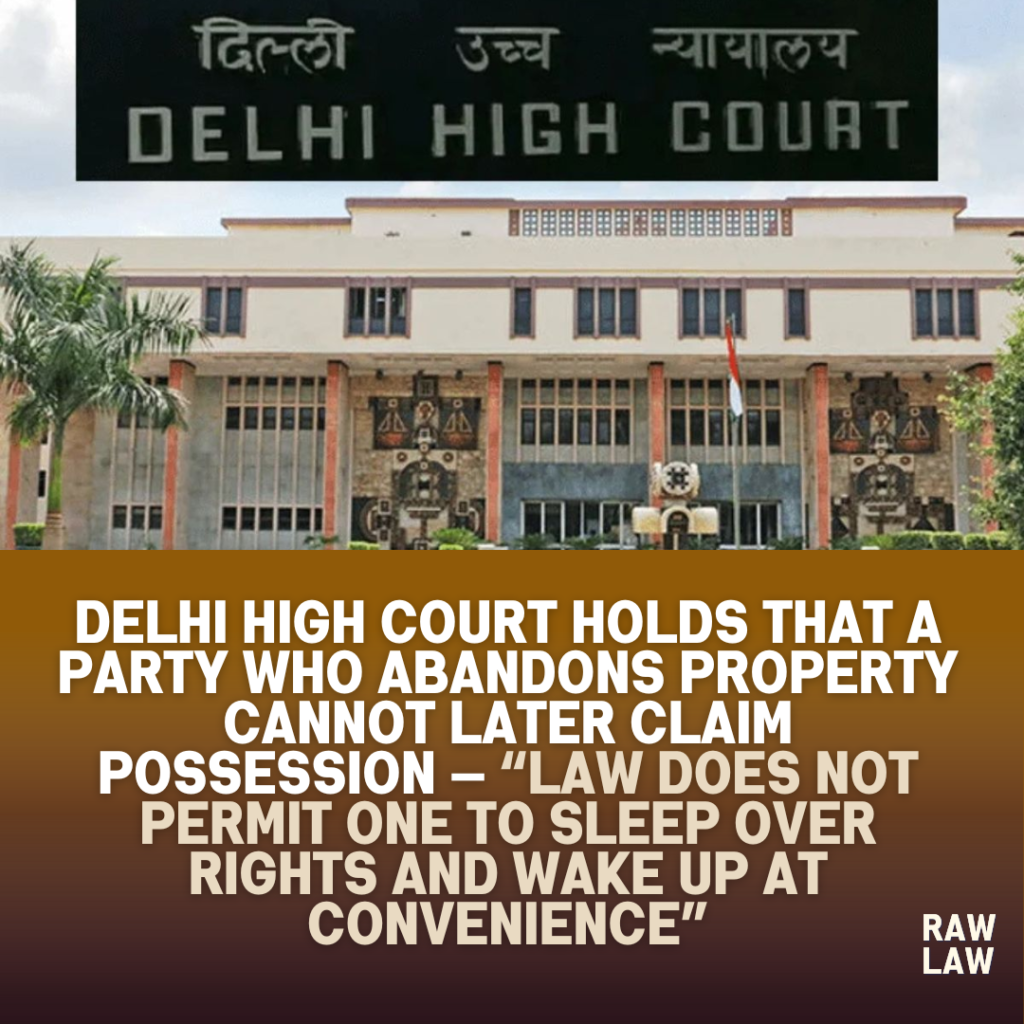Court’s Decision
The Delhi High Court dismissed the appeal challenging concurrent findings of the trial and appellate courts, which had held that the appellant was not entitled to seek possession of the property. The Court emphasized that the evidence showed abandonment of possession and that the law does not permit a party to reclaim possession after long acquiescence. The Court concluded that both the trial court and first appellate court had rightly dismissed the appellant’s claim and no substantial question of law arose for consideration.
Facts
The dispute revolved around immovable property originally belonging to the appellant. The respondent, however, was in settled possession of the property for several years. The appellant contended that the respondent’s occupation was illegal and unauthorized, seeking recovery of possession. Both the trial court and the first appellate court rejected the claim, holding that the appellant had abandoned the property for a long period and allowed the respondent to enjoy possession without interference.
Issues
The principal issue before the High Court was whether the appellant, having abandoned possession for years, could still claim restoration of possession merely on the strength of ownership. The Court also considered whether long inaction and acquiescence disentitled the appellant from relief under law.
Petitioner’s Arguments
The appellant argued that ownership rights cannot be extinguished by mere non-use of property. It was contended that the respondent was a mere trespasser and, as the true owner, the appellant had every right to reclaim possession. The appellant further submitted that the concurrent findings of the trial and appellate courts were erroneous and that the courts below had failed to appreciate the documentary evidence proving title.
Respondent’s Arguments
The respondent maintained that the appellant had voluntarily abandoned possession and had not taken any steps for years to protect or reclaim the property. The respondent stressed that equity did not favour the appellant, who sought to disturb long-settled possession. It was further argued that ownership alone does not automatically entitle a person to possession once they have slept over their rights. The respondent emphasized that the findings of the lower courts were well-reasoned and required no interference.
Analysis of the Law
The Court reiterated that ownership is not an absolute shield when the owner has abandoned possession and allowed another party to enjoy the property without objection. The doctrine of acquiescence and waiver was discussed, wherein a person who neglects their rights over a long period cannot later seek judicial intervention to reclaim possession. The Court underscored that possession, especially when undisturbed for years, is a significant legal right in itself.
Precedent Analysis
The High Court relied upon principles laid down in earlier Supreme Court rulings, including:
- K.K. Dewan v. District Judge – which emphasized that ownership cannot override abandonment and that settled possession is entitled to protection.
- K.K. Verma v. Union of India – where the Court held that mere ownership without possession does not entitle one to disturb long-standing possession.
These cases reinforced the view that possession is a substantive right recognized under law and cannot be unsettled after years of inaction.
Court’s Reasoning
The Court reasoned that the appellant had not only abandoned possession but also acquiesced in the respondent’s enjoyment of the property for years. The appellant’s claim was, therefore, not supported by equity, good conscience, or established principles of property law. The Court observed: “Law does not permit one to sleep over rights and wake up at convenience.” The Court held that both the trial and appellate courts had correctly applied the law and there was no perversity in their findings.
Conclusion
The High Court dismissed the second appeal, holding that the appellant was disentitled from reclaiming possession after long abandonment and acquiescence. The Court observed that ownership must be asserted within a reasonable period, failing which equitable considerations and possession rights prevail.
Implications
This ruling underscores the importance of timely assertion of property rights. It establishes that ownership without active possession and protection may not be sufficient to reclaim property after years of abandonment. The judgment serves as a caution for property owners who neglect their property rights and emphasizes that possession, once settled, carries significant legal weight.
FAQs
Q1: Can an owner reclaim property after abandoning possession for years?
No, the court held that abandonment and acquiescence disentitle the owner from disturbing long-settled possession, even if ownership is not formally extinguished.
Q2: Does ownership automatically guarantee possession in property disputes?
Not necessarily. Ownership without active possession may be insufficient when the owner has long neglected to assert their rights.
Q3: What legal principle did the court emphasize in this judgment?
The principle that “law does not permit one to sleep over rights and wake up at convenience”, highlighting the importance of timely assertion of property rights.
